Operating System System Call Report: University Name, Semester Details
VerifiedAdded on 2023/01/13
|5
|917
|58
Report
AI Summary
This report provides a comprehensive overview of system calls in operating systems. It begins with a basic explanation of system calls, detailing their purpose, the need for them, and their implementation. The report then delves into a specific type of system call: process control within the Linux operating system. It elucidates the main purpose and functionalities of process control system calls, such as fork(), exit(), and wait(). Finally, the report includes a code example, analyzing the implementation procedure of the getpid() system call, demonstrating the practical application of system calls in retrieving process identification. The report references relevant sources to support the information presented.
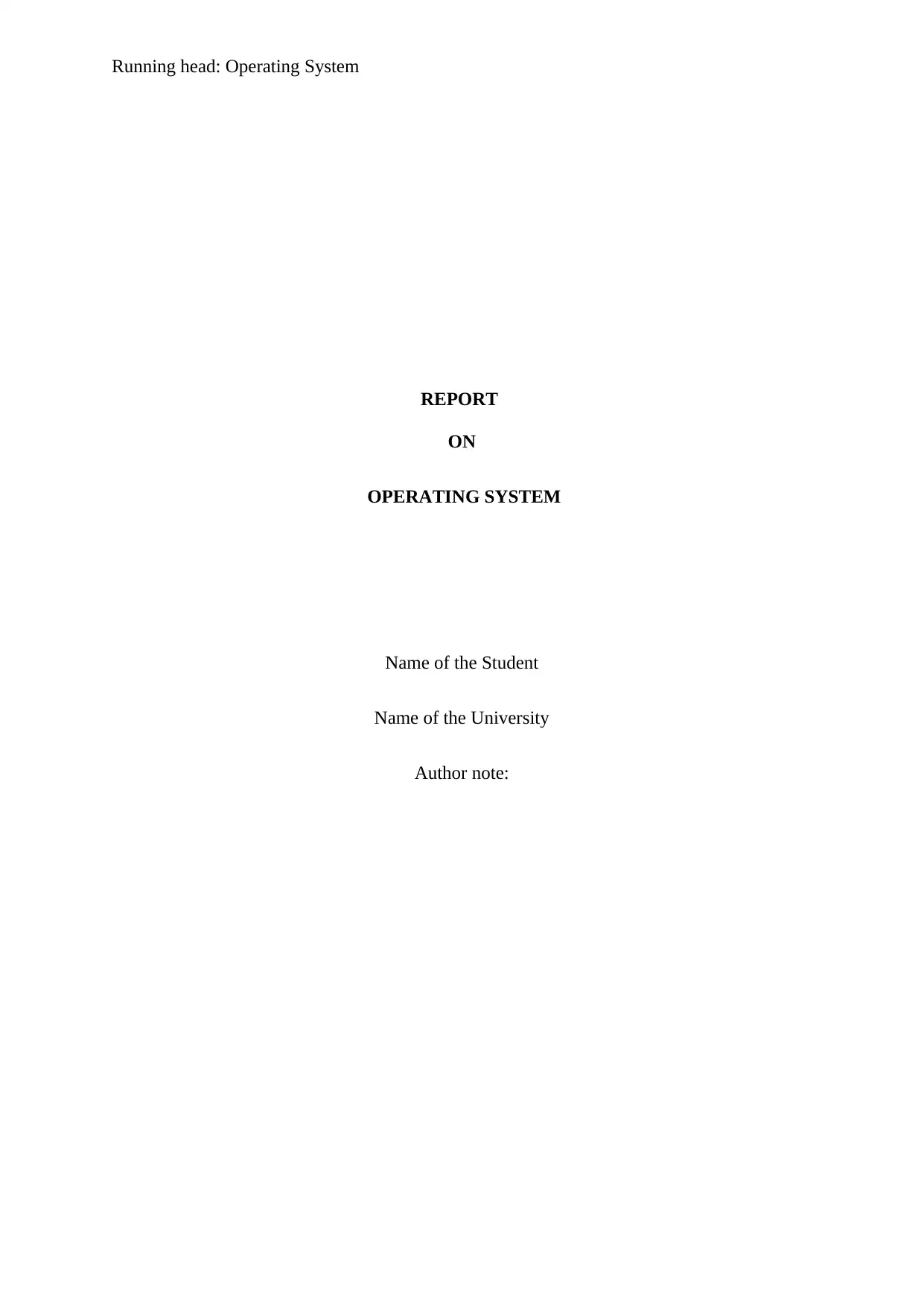
Running head: Operating System
REPORT
ON
OPERATING SYSTEM
Name of the Student
Name of the University
Author note:
REPORT
ON
OPERATING SYSTEM
Name of the Student
Name of the University
Author note:
Paraphrase This Document
Need a fresh take? Get an instant paraphrase of this document with our AI Paraphraser
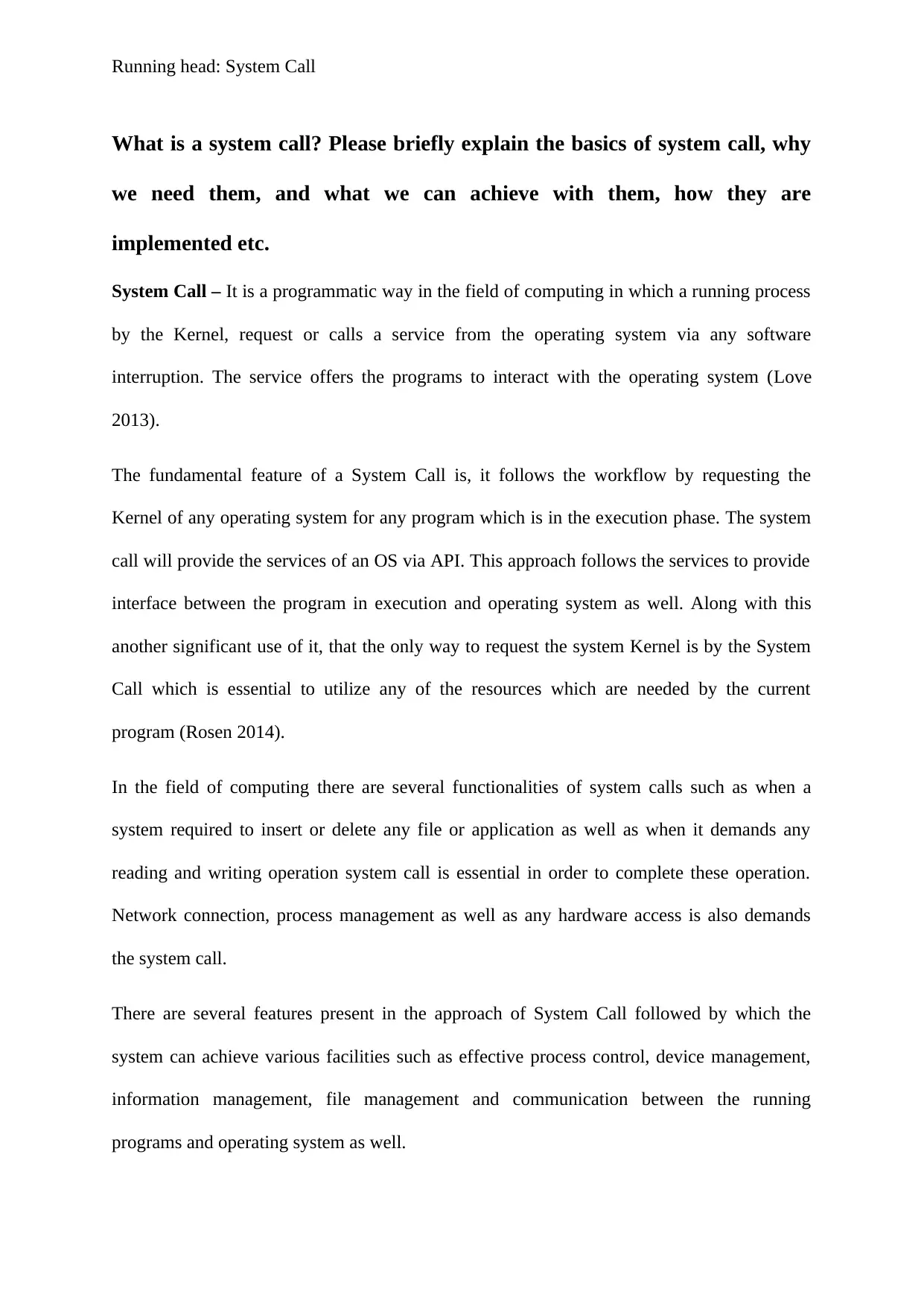
Running head: System Call
What is a system call? Please briefly explain the basics of system call, why
we need them, and what we can achieve with them, how they are
implemented etc.
System Call – It is a programmatic way in the field of computing in which a running process
by the Kernel, request or calls a service from the operating system via any software
interruption. The service offers the programs to interact with the operating system (Love
2013).
The fundamental feature of a System Call is, it follows the workflow by requesting the
Kernel of any operating system for any program which is in the execution phase. The system
call will provide the services of an OS via API. This approach follows the services to provide
interface between the program in execution and operating system as well. Along with this
another significant use of it, that the only way to request the system Kernel is by the System
Call which is essential to utilize any of the resources which are needed by the current
program (Rosen 2014).
In the field of computing there are several functionalities of system calls such as when a
system required to insert or delete any file or application as well as when it demands any
reading and writing operation system call is essential in order to complete these operation.
Network connection, process management as well as any hardware access is also demands
the system call.
There are several features present in the approach of System Call followed by which the
system can achieve various facilities such as effective process control, device management,
information management, file management and communication between the running
programs and operating system as well.
What is a system call? Please briefly explain the basics of system call, why
we need them, and what we can achieve with them, how they are
implemented etc.
System Call – It is a programmatic way in the field of computing in which a running process
by the Kernel, request or calls a service from the operating system via any software
interruption. The service offers the programs to interact with the operating system (Love
2013).
The fundamental feature of a System Call is, it follows the workflow by requesting the
Kernel of any operating system for any program which is in the execution phase. The system
call will provide the services of an OS via API. This approach follows the services to provide
interface between the program in execution and operating system as well. Along with this
another significant use of it, that the only way to request the system Kernel is by the System
Call which is essential to utilize any of the resources which are needed by the current
program (Rosen 2014).
In the field of computing there are several functionalities of system calls such as when a
system required to insert or delete any file or application as well as when it demands any
reading and writing operation system call is essential in order to complete these operation.
Network connection, process management as well as any hardware access is also demands
the system call.
There are several features present in the approach of System Call followed by which the
system can achieve various facilities such as effective process control, device management,
information management, file management and communication between the running
programs and operating system as well.
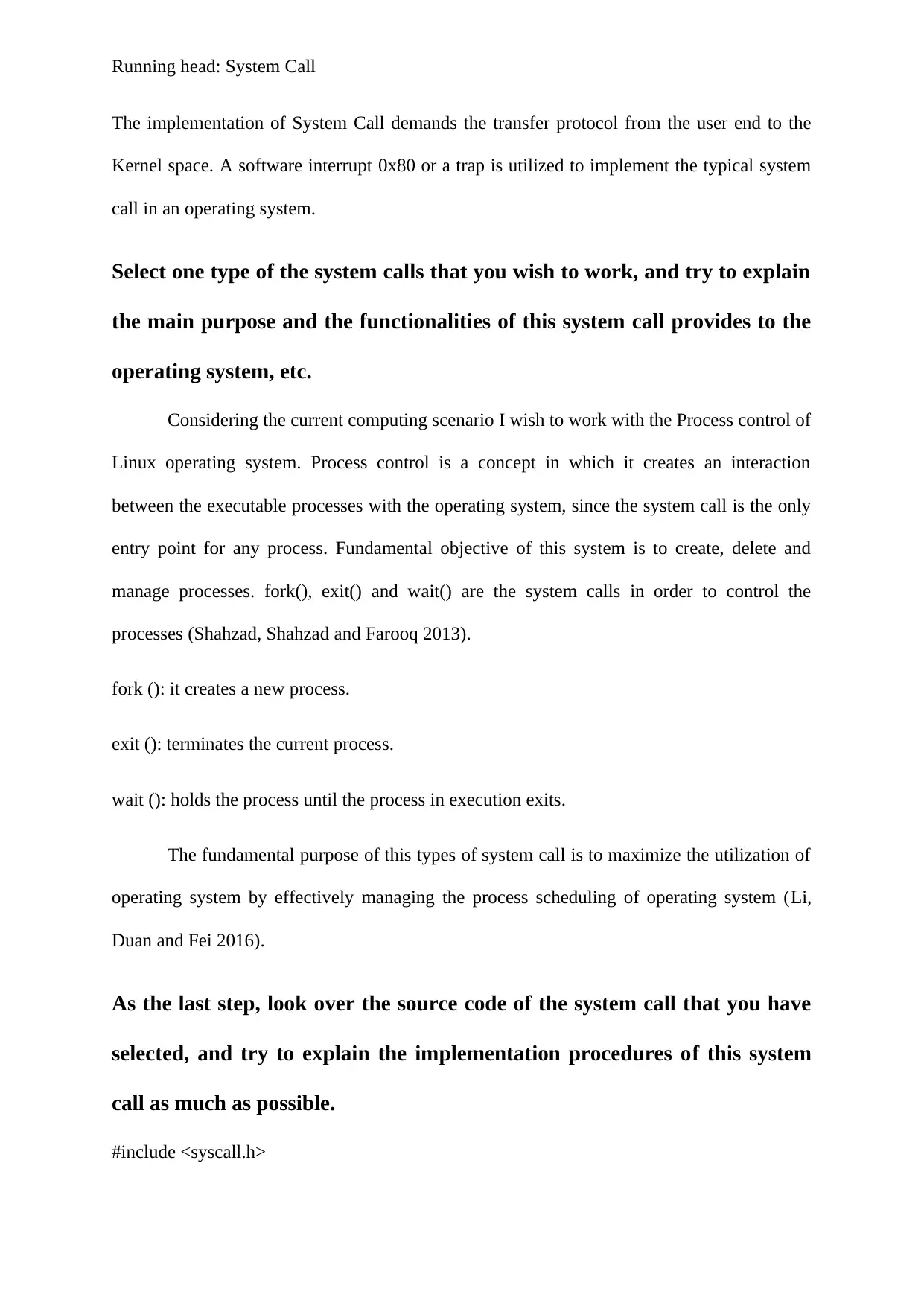
Running head: System Call
The implementation of System Call demands the transfer protocol from the user end to the
Kernel space. A software interrupt 0x80 or a trap is utilized to implement the typical system
call in an operating system.
Select one type of the system calls that you wish to work, and try to explain
the main purpose and the functionalities of this system call provides to the
operating system, etc.
Considering the current computing scenario I wish to work with the Process control of
Linux operating system. Process control is a concept in which it creates an interaction
between the executable processes with the operating system, since the system call is the only
entry point for any process. Fundamental objective of this system is to create, delete and
manage processes. fork(), exit() and wait() are the system calls in order to control the
processes (Shahzad, Shahzad and Farooq 2013).
fork (): it creates a new process.
exit (): terminates the current process.
wait (): holds the process until the process in execution exits.
The fundamental purpose of this types of system call is to maximize the utilization of
operating system by effectively managing the process scheduling of operating system (Li,
Duan and Fei 2016).
As the last step, look over the source code of the system call that you have
selected, and try to explain the implementation procedures of this system
call as much as possible.
#include <syscall.h>
The implementation of System Call demands the transfer protocol from the user end to the
Kernel space. A software interrupt 0x80 or a trap is utilized to implement the typical system
call in an operating system.
Select one type of the system calls that you wish to work, and try to explain
the main purpose and the functionalities of this system call provides to the
operating system, etc.
Considering the current computing scenario I wish to work with the Process control of
Linux operating system. Process control is a concept in which it creates an interaction
between the executable processes with the operating system, since the system call is the only
entry point for any process. Fundamental objective of this system is to create, delete and
manage processes. fork(), exit() and wait() are the system calls in order to control the
processes (Shahzad, Shahzad and Farooq 2013).
fork (): it creates a new process.
exit (): terminates the current process.
wait (): holds the process until the process in execution exits.
The fundamental purpose of this types of system call is to maximize the utilization of
operating system by effectively managing the process scheduling of operating system (Li,
Duan and Fei 2016).
As the last step, look over the source code of the system call that you have
selected, and try to explain the implementation procedures of this system
call as much as possible.
#include <syscall.h>
⊘ This is a preview!⊘
Do you want full access?
Subscribe today to unlock all pages.

Trusted by 1+ million students worldwide
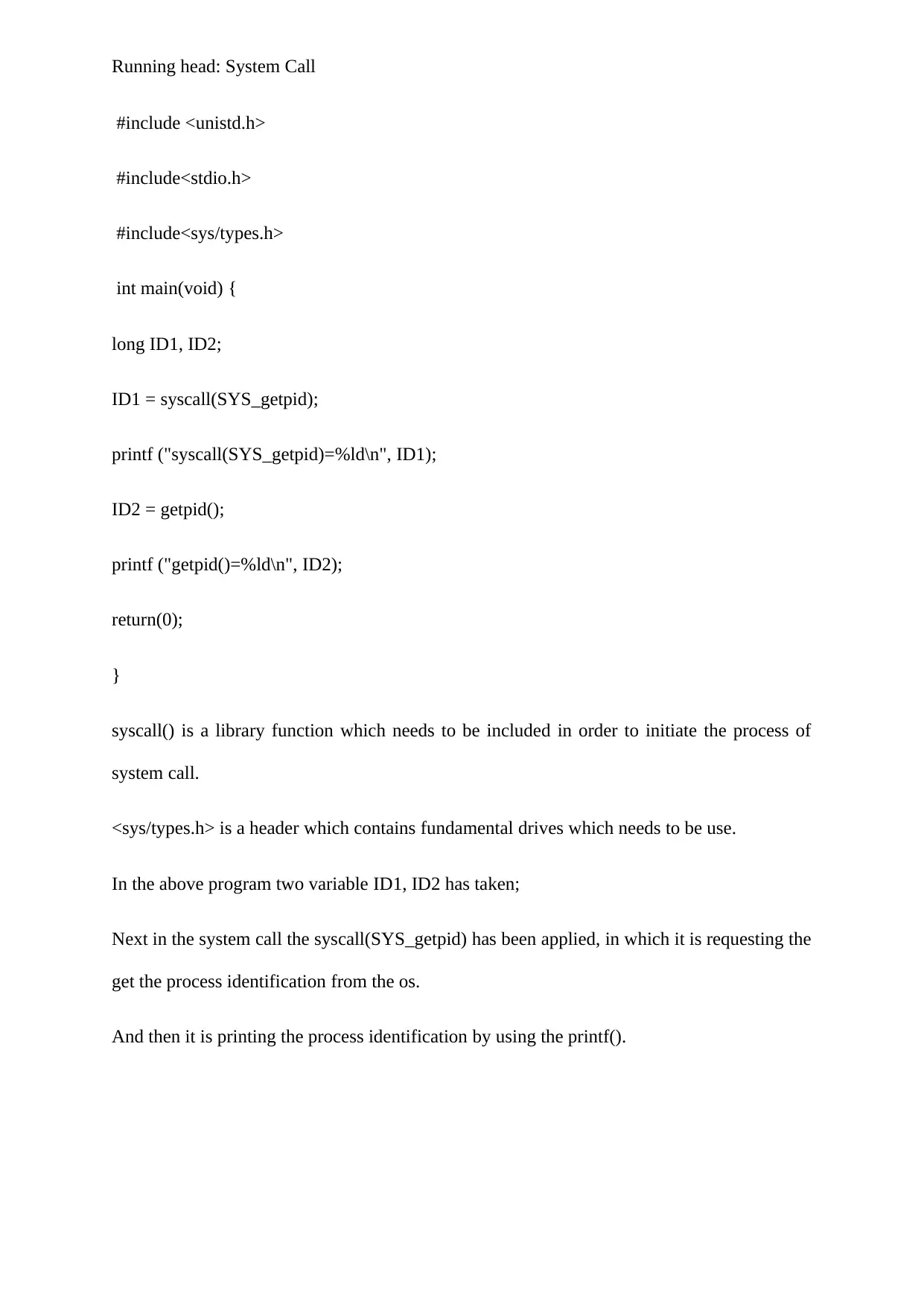
Running head: System Call
#include <unistd.h>
#include<stdio.h>
#include<sys/types.h>
int main(void) {
long ID1, ID2;
ID1 = syscall(SYS_getpid);
printf ("syscall(SYS_getpid)=%ld\n", ID1);
ID2 = getpid();
printf ("getpid()=%ld\n", ID2);
return(0);
}
syscall() is a library function which needs to be included in order to initiate the process of
system call.
<sys/types.h> is a header which contains fundamental drives which needs to be use.
In the above program two variable ID1, ID2 has taken;
Next in the system call the syscall(SYS_getpid) has been applied, in which it is requesting the
get the process identification from the os.
And then it is printing the process identification by using the printf().
#include <unistd.h>
#include<stdio.h>
#include<sys/types.h>
int main(void) {
long ID1, ID2;
ID1 = syscall(SYS_getpid);
printf ("syscall(SYS_getpid)=%ld\n", ID1);
ID2 = getpid();
printf ("getpid()=%ld\n", ID2);
return(0);
}
syscall() is a library function which needs to be included in order to initiate the process of
system call.
<sys/types.h> is a header which contains fundamental drives which needs to be use.
In the above program two variable ID1, ID2 has taken;
Next in the system call the syscall(SYS_getpid) has been applied, in which it is requesting the
get the process identification from the os.
And then it is printing the process identification by using the printf().
Paraphrase This Document
Need a fresh take? Get an instant paraphrase of this document with our AI Paraphraser
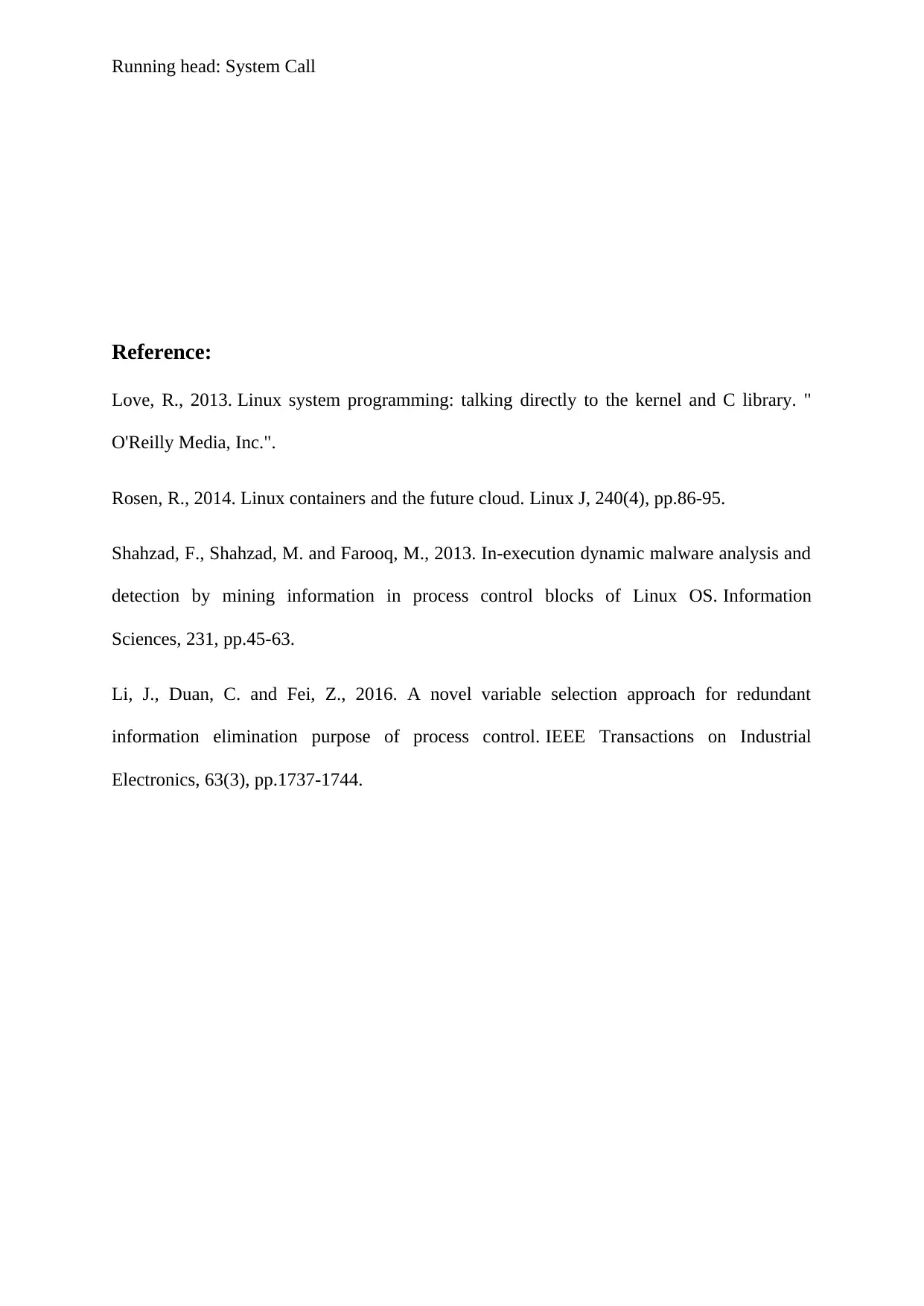
Running head: System Call
Reference:
Love, R., 2013. Linux system programming: talking directly to the kernel and C library. "
O'Reilly Media, Inc.".
Rosen, R., 2014. Linux containers and the future cloud. Linux J, 240(4), pp.86-95.
Shahzad, F., Shahzad, M. and Farooq, M., 2013. In-execution dynamic malware analysis and
detection by mining information in process control blocks of Linux OS. Information
Sciences, 231, pp.45-63.
Li, J., Duan, C. and Fei, Z., 2016. A novel variable selection approach for redundant
information elimination purpose of process control. IEEE Transactions on Industrial
Electronics, 63(3), pp.1737-1744.
Reference:
Love, R., 2013. Linux system programming: talking directly to the kernel and C library. "
O'Reilly Media, Inc.".
Rosen, R., 2014. Linux containers and the future cloud. Linux J, 240(4), pp.86-95.
Shahzad, F., Shahzad, M. and Farooq, M., 2013. In-execution dynamic malware analysis and
detection by mining information in process control blocks of Linux OS. Information
Sciences, 231, pp.45-63.
Li, J., Duan, C. and Fei, Z., 2016. A novel variable selection approach for redundant
information elimination purpose of process control. IEEE Transactions on Industrial
Electronics, 63(3), pp.1737-1744.
1 out of 5
Related Documents
Your All-in-One AI-Powered Toolkit for Academic Success.
+13062052269
info@desklib.com
Available 24*7 on WhatsApp / Email
![[object Object]](/_next/static/media/star-bottom.7253800d.svg)
Unlock your academic potential
Copyright © 2020–2026 A2Z Services. All Rights Reserved. Developed and managed by ZUCOL.





